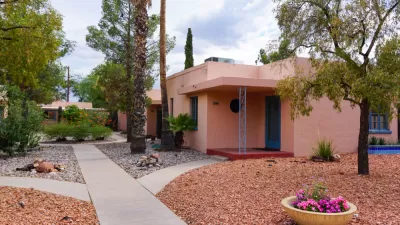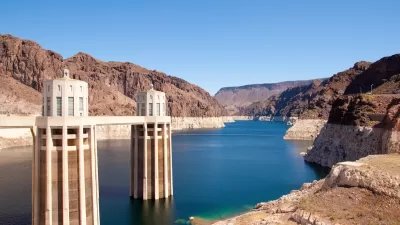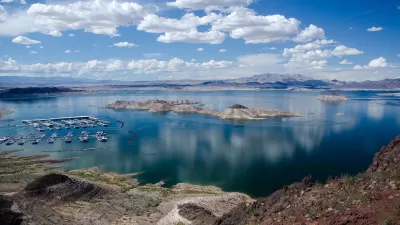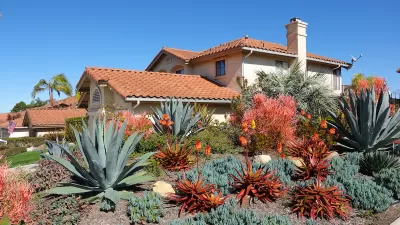The city could ban the planting of “nonfunctional” grass in new developments, but would stop short of regulating lawns and golf courses.

A Tucson proposal could ban “nonfunctional” grass planting in some developments, reports Tony Davis in the Arizona Daily Star, following in the footsteps of cities like Las Vegas as the West’s water shortage continues.
Councilman Kevin Dahl, who supports the legislation, defined nonfunctional grass as “any irrigated grass area not providing functional use, such as grass along streets in strip malls, shopping centers, and businesses, and also turf managed by an HOA (a homeowners association) that does not provide recreational value for people or pets.”
Davis notes that the ban would not extend to new single-family neighborhoods, parks, school playgrounds, or golf courses, which some critics say doesn’t go far enough. Others worry that the vague and subjective definition of “nonfunctional” could make the ban difficult to enforce.
Tucson officials are working with other cities in the region to come up with a water conservation plan by November 15, but have not signed on to the current plan yet. “Among other things, the proposal now calls for a program ‘to reduce the quantity of nonfunctional turf grass by 30% through replacement with drought- and climate-resilient landscaping, while maintaining vital urban landscapes and tree canopies that benefit our communities, wildlife, and the environment.’”
In Southern Nevada, in the water district that includes Las Vegas, development codes prohibit “any grass in new construction of commercial developments and the front yards of new single-family home developments.” In Colorado, the Castle Rock town council voted to ban grass lawns in the front yards of new homes and limit grass turf lawns to 500 square feet in backyards, just a month after Aurora passed a similar law.
FULL STORY: "Ornamental"grass could soon be banned in some Tucson developments

Alabama: Trump Terminates Settlements for Black Communities Harmed By Raw Sewage
Trump deemed the landmark civil rights agreement “illegal DEI and environmental justice policy.”

Planetizen Federal Action Tracker
A weekly monitor of how Trump’s orders and actions are impacting planners and planning in America.

The 120 Year Old Tiny Home Villages That Sheltered San Francisco’s Earthquake Refugees
More than a century ago, San Francisco mobilized to house thousands of residents displaced by the 1906 earthquake. Could their strategy offer a model for the present?

In Both Crashes and Crime, Public Transportation is Far Safer than Driving
Contrary to popular assumptions, public transportation has far lower crash and crime rates than automobile travel. For safer communities, improve and encourage transit travel.

Report: Zoning Reforms Should Complement Nashville’s Ambitious Transit Plan
Without reform, restrictive zoning codes will limit the impact of the city’s planned transit expansion and could exclude some of the residents who depend on transit the most.

Judge Orders Release of Frozen IRA, IIJA Funding
The decision is a victory for environmental groups who charged that freezing funds for critical infrastructure and disaster response programs caused “real and irreparable harm” to communities.
Urban Design for Planners 1: Software Tools
This six-course series explores essential urban design concepts using open source software and equips planners with the tools they need to participate fully in the urban design process.
Planning for Universal Design
Learn the tools for implementing Universal Design in planning regulations.
Clanton & Associates, Inc.
Jessamine County Fiscal Court
Institute for Housing and Urban Development Studies (IHS)
City of Grandview
Harvard GSD Executive Education
Toledo-Lucas County Plan Commissions
Salt Lake City
NYU Wagner Graduate School of Public Service





























